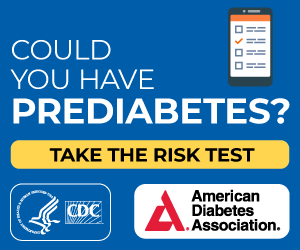What is Type 2 Diabetes?
Type 2 diabetes is the most common form of diabetes. Most of the food we eat is turned into glucose, or sugar, for our bodies to use for energy. The pancreas, an organ that lies near the stomach, makes a hormone called insulin to help glucose get into the cells of our bodies. When you have type 2 diabetes, your body can’t use its own insulin as well as it should. This causes sugar to build up in your blood.
Type 2 diabetes is a serious condition. It can lead to health issues such as heart attack; stroke; blindness; kidney failure; or loss of toes, feet, or legs.
Back to TopWhat Is the Difference Between Type 1 and Type 2 Diabetes?
Type 1 diabetes occurs when our body does not produce enough insulin. It can develop at any age, and lifestyle changes will not prevent type 1 diabetes. This form of diabetes affects around 5% of all diagnosed cases of adults with diabetes. Type 2 diabetes occurs when our body can not properly utilize insulin. It can develop at any age, but most cases can be prevented through lifestyle change. Type 2 diabetes is the most common form of diabetes, affecting around 95% of all diagnosed cases of diabetes.
Back to TopWhat is Prediabetes?
Prediabetes is a blood glucose (sugar) level that is higher than normal but not high enough to be diagnosed as diabetes. One in three American adults has prediabetes, and most do not even know they have it. If you have prediabetes and do not lose weight or do moderate physical activity, you can develop type 2 diabetes within 5 years.
Back to TopAm I at Risk for Prediabetes and Type 2 Diabetes?
You are at increased risk for developing prediabetes and type 2 diabetes if you:
- Are 45 years of age or older;
- Are overweight;
- Have a family history of type 2 diabetes;
- Are physically active fewer than three times per week; or
- Ever had diabetes while pregnant (gestational diabetes) or gave birth to a baby that weighed more than 9 pounds.
If you think you may be at risk, a health care provider can do a blood test to see if you have diabetes or prediabetes.
Back to TopCan I Prevent Type 2 Diabetes?
Yes! Hearing your doctor say, “You’re at risk for type 2 diabetes,” or “You have prediabetes,” means that you can start preventing type 2 diabetes today. And you do not have to do it alone. Finding the University of Arizona Cooperative Extension’s Diabetes Prevention Program was your first step on that journey. If you have prediabetes, now is the time for prevention. Our lifestyle change program can help you take charge of your health to prevent or delay type 2 diabetes.
Back to Top

